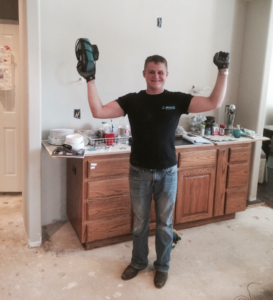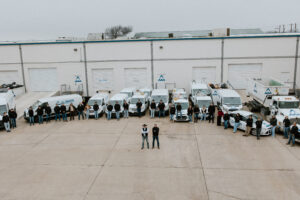There’s a point in the life of every growing business where the excitement of growth begins to feel less like a rush—and more like a weight. For me, and for many entrepreneurs I’ve spoken with, that point tends to hit right arou

nd the $5 million mark in gross sales.
It’s not a number you’ll find carved into stone or featured in textbooks. But in real life—in the trenches of small business—it’s a very real threshold. One I’ve experienced personally as the founder of All Nation Restoration here in Austin, Texas.
At that stage, your company is no longer “small” in the startup sense.
You’re not flying solo with a couple of employees anymore. You’ve built a team. You’ve built momentum. But you’re not yet large enough to have the kind of deep infrastructure and redundancy that bigger companies rely on to stay stable.
And that’s where the cracks start to show.
In the early days of All Nation Restoration, everything ran on instinct and hustle. I knew every employee personally. I was in every deal, on every job site, in every late-night decision. The systems were fast, flexible, and built for survival.
But when we started growing rapidly, those same systems became liabilities. What once felt like agile responsiveness started to feel like chaos. Payroll got heavier. Decision-making slowed. Internal communication became harder. And the energy I had relied on to build the company became harder to access under the weight of it all.
I’ve seen it happen to others too—good people, smart entrepreneurs—who scale too fast or hold on too long to systems that were built for a smaller operation. It doesn’t just cost them efficiency. It costs them their peace. Their families. And in a few tragic cases I’ve witnessed… their lives.
Recently, I sat down with a father who had just buried his son—a young man who built an HVAC company that expanded into multiple states and employed over 400 people. By all external measures, he was a success story.
But behind the scenes, things were unraveling.
The father told me that when COVID hit, their company was locked into contracts they couldn’t fulfill. Prices had changed, supply chains collapsed, and bankruptcy felt inevitable. He believed there was nothing his son could have done differently.
I understood where he was coming from. I respected his pain. But I also had to ask the question I couldn’t let go of:
“If your son had called a company-wide meeting—told everyone the truth—and asked for help, what would’ve happened?”
He paused. Thought about it.
“Maybe half would’ve quit,” he said.
So I asked, “What about the other half?”
And he looked at me and said something I’ll never forget.
“Those guys? They would’ve slept in the office. They would’ve worked 90-hour weeks. They wouldn’t have asked for a dime.”
I leaned in and asked, “If he had done that… do you think he could’ve stayed in business?”
He looked away for a second. Then met my eyes.
“Well, dammit, Ben. Just maybe.”
Sometimes in business, just maybe is all you need.
Just maybe is the sliver of daylight in a dark room.
Just maybe is the crack in the wall wide enough to fit a lifeline through.
But you’ll never reach for it if your hands are full of pride.
That’s what we don’t talk about enough in the business world: the emotional cost of growth, and the trap of pride that so many entrepreneurs fall into—especially when they’ve tasted success.
We’re taught that confidence and vision are essential—and they are. But the very qualities that get you started can become the ones that destroy you if you don’t know when to evolve.
In my experience, the only antidote to the pressure, the anxiety, the emotional burnout that can come with scaling a company—is humility.
Humility isn’t weakness.
It’s wisdom.
It’s being able to say:
If you’re building a company—especially one approaching or passing that $5 million mark—you need to carry that antidote in your back pocket. You need a “hidden key” that lets you unlock a way out of the trap when your own creation starts consuming you.
Because the business you’re building?
It’s powerful.
It’s beautiful.
It might even change your life.
But if you don’t understand how it evolves—and how you must evolve with it—it can also destroy you.

I’m not writing this from the mountaintop. I’m still in the fight. Still building. Still learning.
And what I’ve learned is this:
The difference between staying in business and falling apart isn’t always your product, your market, or your numbers.
Sometimes, it’s your ability to tell the truth—to yourself and to your team.
When things feel heavy, don’t isolate. Don’t pretend. Don’t fake it.
Gather your people.
Tell the truth.
Ask for help.
You may lose some along the way.
But the ones who stay?
They just might save your company.
So here’s my advice to any entrepreneur approaching that critical growth phase:
Stay humble. Stay honest. Stay human.
And above all—
Stay strong. Stay focused. Stay in business.